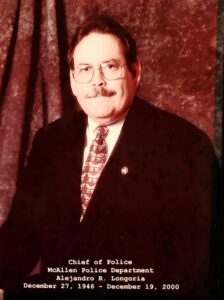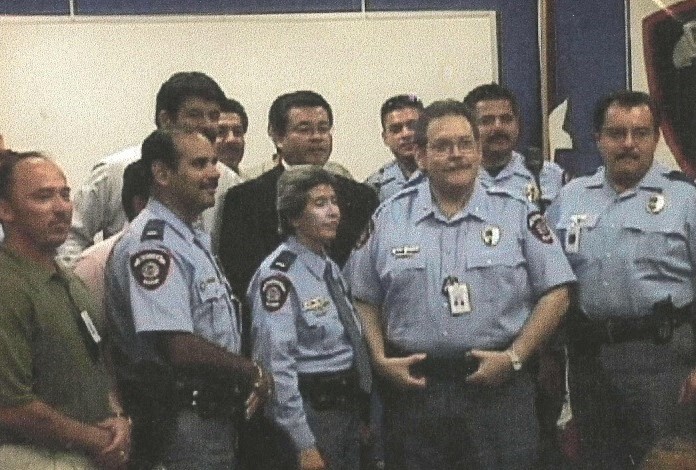
A local committee is petitioning the city of McAllen to honor former Police Chief Alejandro Longoria by renaming the city’s public safety building after him.
As the 21st anniversary of Longoria’s death approaches on Dec. 19, a group of local community members and former police officers are pushing the city commission for the name change as a way to honor the chief and his leadership during a tumultuous period for the police department.
In 1981, video tapes surfaced showing instances of police brutality on the part of McAllen police officers. Of 72 incidents that were visible on tape, nearly all were against Mexican-Americans. Officers who participated in the violence were both Mexican-Americans and Anglos, according to a report by the Washington Post.
In the reorganization of the department that followed, Longoria was appointed captain that year and later became chief in September 1985. He held the position for 15 years until 2000. He died on Dec. 19 of that year after being diagnosed with melanoma.
“When I started back in 1991, all that stuff was coming out and one of the things that happened was they instituted some court-mandated training for the policemen so that what happened in the past would not occur again,” said Ramiro Gonzalez, a retired McAllen police officer, who is a member of the committee.
“It shows that police reform does work,” Gonzalez added. “We went through it way back in the early 80s as a result of this police brutality that McAllen police had.”
Gonzalez and the committee credit Longoria for implementing a community-oriented model in an effort to rebuild trust with their residents.
“I think we’re lucky, we’re lucky that Chief Longoria had the initiative to accept all the police reform and changes to where what’s happening around the country has not affected us that much here,” Gonzalez said, referring to recent incidents of police brutality, specifically against Black people, that spurred the Black Lives Matter movement.

Lessons from what the McAllen police department went through can be applied to the current state of police departments across the country, said Christina “Tina” Guerra, a retired state police officer who served in the McAllen police department in 1978 and then again from 1980 until 1992.
“Police reform hurts, police reform is hard, but it’s often necessary and you have to have the right leaders in place to be able to navigate that when that happens to be able to bridge the needs of the officers with what the citizens deserve, and that’s a hard line to toe,” Guerra said.
“And I don’t want to minimize the Black Lives Matter (movement),” Guerra added, “I don’t want to make comparisons because our historical differences have been substantially different, but yet … people forget things.”
She recalled a time when some of her Anglo colleagues didn’t understand the significance of when the Texas Department of Public Safety promoted their first Hispanic officer to the Texas Rangers.
“And I’m thinking, ‘Oh my god, do you not know the history of the Texas Rangers? They lynched Hispanics! This is a huge threshold to cross,'” she said. “People don’t remember history.”
It is the hope of preventing his legacy from fading into history that largely motivated the committee to push for the renaming of the public safety building after Longoria. The plans for that building began under his stewardship and the city broke ground on the building the day he died.

Among his accomplishments, Longoria introduced foot patrol, K-9 patrols, bike patrol, teen court, the D.A.R.E program, the Explosive Ordnance Disposal Unit, and the G.R.E.A.T program, a gang and violence prevention program, according to a biography issued by the committee.
He also developed and organized the South Texas Auto Theft Enforcement Task Force, helped to establish the Combined Government Drug Enforcement and Special Crimes Task Force, and introduced computer technology to the police department.
“It was just a very interesting time and we were talking about how things just got lost,” Guerra said. “Nobody knows about this and you’re talking about generations that are coming up when all this is going on all over the country and we had it in our own backyard 40 years ago.”
“And look at the result of it,” she said. “McAllen has pretty much flourished because of that foundation that was laid and people forget and we didn’t want people to forget.”




